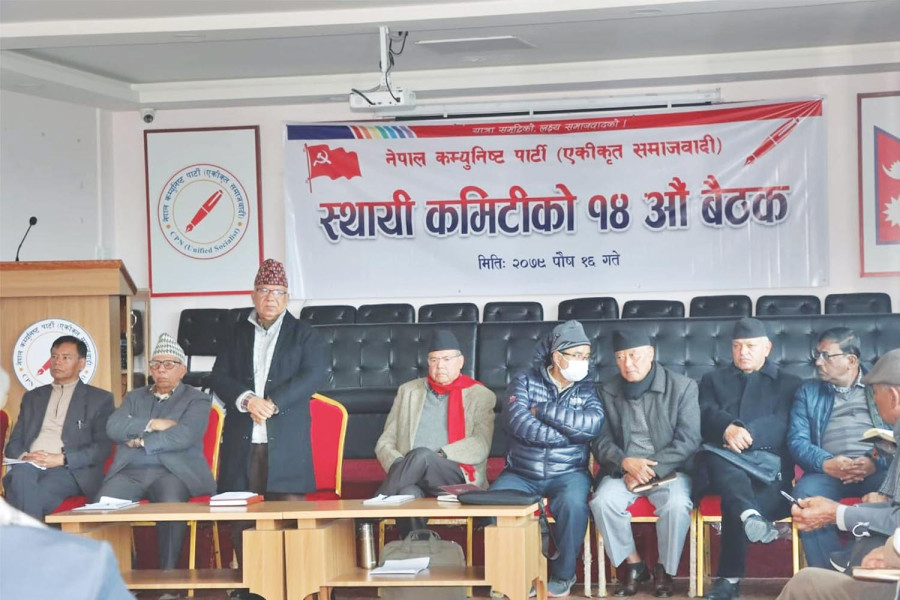Politics
Unified Socialist leaders divided over whether to join Dahal-led government
Prime Minister Pushpa Kamal Dahal is said to be discussing with Madhav Kumar Nepal to take the party on board.
Purushottam Poudel
The CPN (Unified Socialist) is still undecided on whether to join the Puspha Kamal Dahal-led government. Speaking to the Post, party leaders refuted rumours that the party is joining the new administration soon.
The party had called a standing committee meeting on Saturday to take a decision on joining the Dahal-led government.
“The ruling coalition has not formally asked our party to join the government yet,” Bijay Poudel, the deputy general secretary of the Unified Socialist, told the Post. “The party is still on a wait-and-watch mode to support the government.”
Dahal on Sunday ditched the Congress-led coalition and joined hands with the CPN-UML to become the prime minister with support from Rastriya Swatantra Party, Rastriya Prajatantra Party, Janata Samajbadi Party, Janamat Party and Nagarik Unmukti Party.
Maoist Centre and Unified Socialist were earlier in the same Congress-led alliance and contested the November elections under it. But when Dahal suddenly joined hands with KP Sharma Oli, Unified Socialist chair Madhav Kumar Nepal was left behind.
According to leaders privy to the development, Dahal has been in frequent contact with Nepal since he became prime minister with the support of 169 parliamentarians. Some leaders of the Unified Socialist, which split from the UML nearly two years ago, are reportedly hesitant to join the UML-led camp.
“On what ground should the party join the government formed with the support of the alliance led by UML?” Poudel told the Post. “We have not reached a conclusion on this matter yet.”
Insiders, however, said there is still a high probability that the party would join the government. “There are many leaders in the party who believe the party should join the new administration,” a leader told the Post on the condition of anonymity.
Meanwhile, many Unified Socialist leaders are also lobbying to reunite with the UML. However, many say that is not possible in the immediate future. “It may take some time to decide on party unification but at the moment, our party chair is under pressure from within the party to join the government,” the leader said. “The leadership is waiting for an appropriate moment to decide on it.”
On Wednesday, party chair Nepal met with Prime Minister Dahal in a private setting at Hattiban, Lalitpur. Citing the meeting, the party insider said, “It won’t be surprising if the party joins the government.”
Meanwhile, the party organised a virtual meeting with leaders of its sister organisations on Wednesday and Thursday, during which party chair Nepal discussed with them the prospect of joining the government, said leaders privy to the meeting.
“Some say the party should join the government, while others are opposed to the proposal,” party spokesperson Jagannath Khatiwada said. “Leaders in favour of the proposal say the party can connect with the people when it heads some ministries.”
Khatiwada denied rumours that party chair Nepal would become the President. “Such claims that our party chair will become the head of state have no basis,” Khatiwada told the Post.
Pradeep Gyawali, a deputy general secretary of the UML, has also rubbished reports that major parties were considering Nepal as a presidential candidate. Gyawali on Friday took to social media to refute the rumours.
There, however, is no denying that the party is considering merger with the mother party UML or the Maoist Centre, given its lacklustre performance in the general elections.
On August 22, Maoist Centre chair Dahal and Unified Socialist chief Nepal had decided that their parties would contest the November 20 election with a common manifesto. But the decision proved to be short-sighted as other leaders of Nepal’s party quickly warned against any such move.
The parties had also decided to unify after the election and formed a joint task force for the purpose. But the fate of the decision remains unknown.
“But later the Maoist Centre deviated from the decision,” Poudel, the deputy general secretary, said. “We have not thought about unification again.”




 13.12°C Kathmandu
13.12°C Kathmandu














